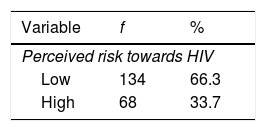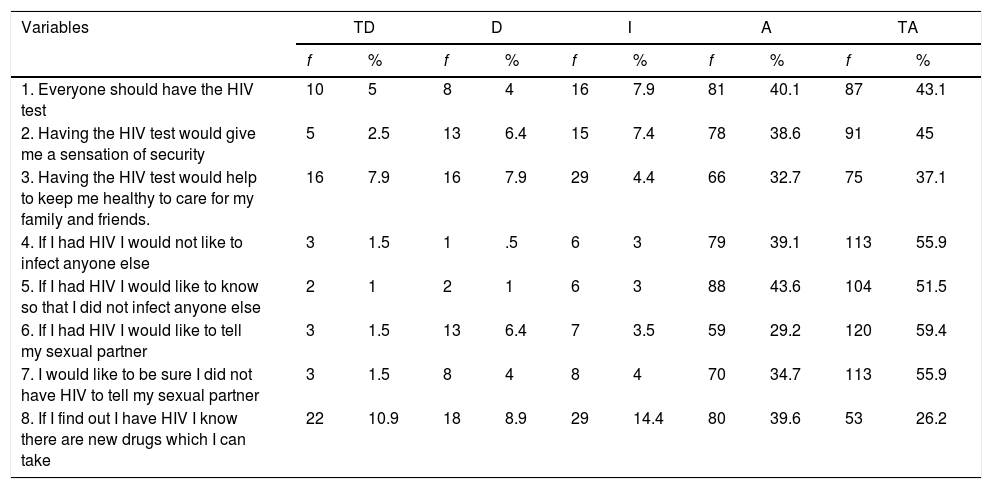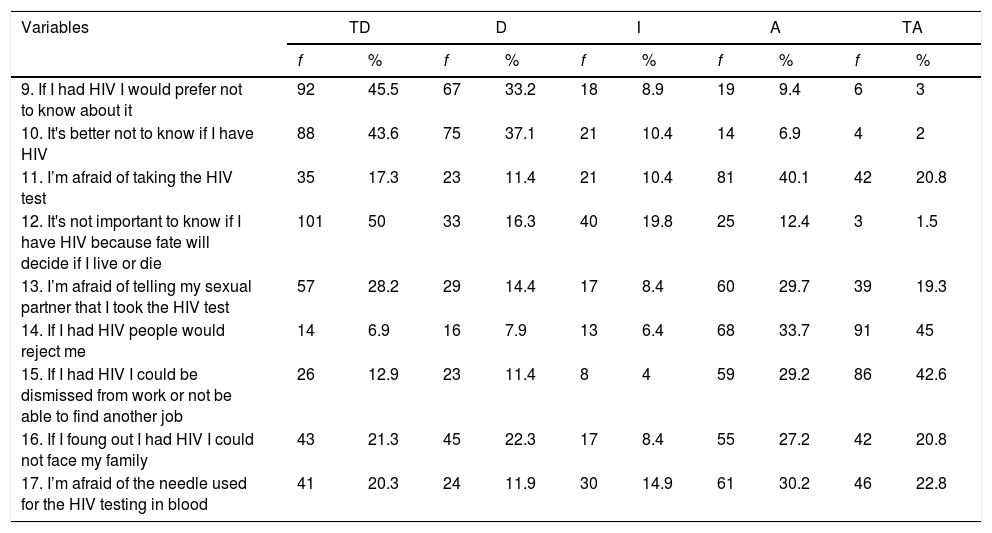The perceived risk to HIV and the decisional balance (pros and cons) towards HIV testing are fundamental aspects for understanding the motivation of men who have sex with men to engage in behaviours that reduce or increase the risk of infection with the virus.
ObjectivesTo describe the perceived risk of HIV and the decisional balance towards HIV testing and determine the association between perceived risk and the decisional balance towards HIV testing of men who have sex with men.
MethodDescriptive correlational design, we used respondent-driven sampling, with which we recruited 202 men who have sex with men.
ResultsMean age of 27.79 (SD=8.13), 66.3% reported low perceived risk to HIV. The most significant pros were: “If I had HIV I would not want to infect anyone else” (95%) and “I would like to be sure I did not have HIV to tell my sexual partner” (90.6%). The most significant cons were: “I am afraid of the needle used for the HIV test” (53%), “people could reject me if they had HIV” (78.7%). Finally, there was a correlation between the perceived risk and the decisional balance towards HIV testing (rs=.759, p<.001).
ConclusionsGiven such data, in future interventions it is important to consider information about the importance of HIV testing on a regular basis, as well as actions to increase the perception of vulnerability to HIV in this population.
El riesgo percibido hacia el VIH y el balance decisional (pros y contras) hacia la prueba del VIH son aspectos fundamentales para la comprensión de la motivación de los hombres que tienen sexo con hombres para involucrarse en conductas que reduzcan o aumenten el riesgo de infección ante el virus.
ObjetivosDescribir el riesgo percibido hacia el VIH y el balance decisional hacia la prueba del VIH y determinar la asociación entre el riesgo percibido y el balance decisional hacia la prueba del VIH en hombres que tienen sexo con hombres.
MétodoDiseño descriptivo correlacional, se utilizó un muestreo dirigido por entrevistados con el cual se reclutaron 202 hombres que tienen sexo con hombres.
ResultadosEdad media de 27,79 (DE=8,13), el 66,3% reportó baja percepción de riesgo hacia el VIH. Los pros más significativos fueron: «si tuviera el VIH no quisiera infectar a nadie más» (95%) y «quisiera estar seguro de no tener el VIH para decírselo a mi pareja sexual» (90,6%). Lo contras más significativos fueron: «tengo miedo a la aguja utilizada para la prueba de detección del VIH» (53%), «la gente me podría rechazar si tuviera el VIH» (78,7%). Finalmente, se identificó correlación entre el riesgo percibido y el balance decisional hacia la prueba del VIH (rs=0,759, p<0,001).
ConclusionesAnte tales datos, es importante considerar en futuras intervenciones, información sobre la importancia de la prueba del VIH de forma periódica, así como acciones para aumentar la percepción de vulnerabilidad hacia el VIH en esta población.
Artículo
Comprando el artículo el PDF del mismo podrá ser descargado
Precio 19,34 €
Comprar ahora










